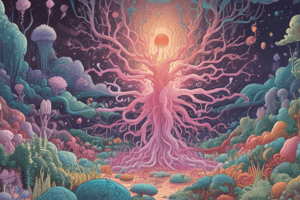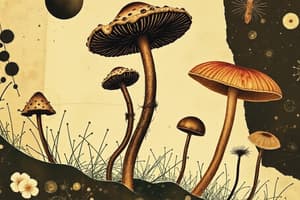Podcast
Questions and Answers
What is the role of phytoplankton in ecosystems?
What is the role of phytoplankton in ecosystems?
- Causing infectious diseases
- Regulating climate by absorbing carbon dioxide (correct)
- Controlling water pollution
- Enhancing soil fertility
Which of the following is NOT a function of the human microbiome?
Which of the following is NOT a function of the human microbiome?
- Aiding digestion
- Producing essential vitamins
- Regulating blood sugar levels (correct)
- Maintaining a healthy immune system
Why are protists significant in ecosystems?
Why are protists significant in ecosystems?
- They are responsible for antibiotic resistance
- They help in regulating climate by releasing greenhouse gases
- They cause diseases in plants
- They are crucial for the food chain (correct)
Which microorganism group helps prevent the growth of pathogenic microorganisms in the gut?
Which microorganism group helps prevent the growth of pathogenic microorganisms in the gut?
What is a common feature of the gut microbiome?
What is a common feature of the gut microbiome?
Which of the following microorganisms is known for fermenting sugars into alcohol for bread and beer?
Which of the following microorganisms is known for fermenting sugars into alcohol for bread and beer?
What is a key characteristic of viruses mentioned in the text?
What is a key characteristic of viruses mentioned in the text?
In what way do many bacteria contribute to our existence according to the text?
In what way do many bacteria contribute to our existence according to the text?
Which type of microorganism is described as a diverse group of eukaryotic organisms in the text?
Which type of microorganism is described as a diverse group of eukaryotic organisms in the text?
What is a major role of fungi in the microbial world according to the text?
What is a major role of fungi in the microbial world according to the text?
Flashcards are hidden until you start studying
Study Notes
Discovering the Microbial World: Fungi, Viruses, Bacteria, and Protists, plus the Microbiome
Our planet teems with microscopic life, and beneath the surface of every pond, forest, and human body lies a bustling community of microorganisms. Let's delve into the depths of this miniature world, focusing on the major players: fungi, viruses, bacteria, protists, and the microbiome.
Fungi
From mushrooms to yeast, fungi are essential components of our microbial world. They thrive in a variety of environments and play key roles in decomposition, symbiotic relationships, and our food supply. Yeast ferments sugars into alcohol for bread and beer, while some mushrooms provide delicious meals and medicinal properties.
Viruses
Although tiny and often overlooked, viruses are a crucial part of the microbial world. These infectious agents require a host organism to replicate and cause disease in multicellular life forms, from animals to plants. However, not all viruses are pathogenic; many are beneficial and help regulate microbial populations.
Bacteria
Bacteria are one of the most diverse and abundant forms of life on Earth. They can be found in virtually every environment, and many bacteria are vital to our existence, participating in nutrient cycling, maintaining soil health, and serving as the cornerstone of metabolic pathways.
Protists
Protists are a diverse group of eukaryotic organisms, including single-celled and multicellular forms. They are often overlooked in discussions of microbes, but protists play significant roles in ecosystems, such as phytoplankton, which are crucial for the food chain and contribute to climate regulation by absorbing carbon dioxide.
Microbiome
The microbiome refers to the collection of microorganisms and their genetic material present in a particular ecosystem or organism. In humans, the microbiome is essential for maintaining a healthy immune system, aiding digestion, and producing various essential vitamins. The microbiome can be influenced by factors such as diet, hygiene, and antibiotic use.
The Microbiome in Action
The human body is home to a complex community of microorganisms that outnumber our own cells, and the microbiome plays a crucial role in our health and well-being. For example, the gut microbiome helps regulate digestion, maintain the integrity of the intestinal barrier, and prevent the growth of pathogenic microorganisms.
The "No Search" feature in Bing Chat (see the search results for context) is irrelevant to our exploration of the microbial world, as it refers to a feature that allows users to ask Bing Chat questions without it searching the web for answers. In contrast, understanding the microbial world requires studying the organisms and their interactions in their natural environments.
Ultimately, the microbial world is both diverse and fascinating, and understanding its components and interactions is crucial for maintaining a healthy planet. From fungi to protists, each group plays a vital role in maintaining ecosystems, and their study can lead to new insights and discoveries.
Studying That Suits You
Use AI to generate personalized quizzes and flashcards to suit your learning preferences.




